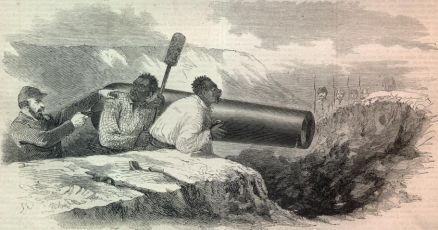Black Confederates is a term that describes the enslaved and free black people who made significant contributions to the Confederacy during the Civil War. Historically, "Confederate Negro" was a term that was used in North Carolina and other southern states during the period to describe Black people who aided the Confederacy. Some enslaved people served in noncombatant roles, such as nurses in government hospitals, supply wagon and ambulance drivers, and cooks. They were also forced or impressed (in most cases) to construct fortifications around cities and strategic military sites like Fort Fisher. This use of enslaved labor for the construction of infrastructure was also seen in the Antebellum Period. At times, enslaved people carried news from home and delivered supplies and food to their enslavers on the battlefield, or they brought home the wounded and dead.

Service of Black people to the Confederacy was generally coerced or forced, and not given freely. Enslaved Black men were rented out by their enslavers to perform these roles. Free Black men living in the proclaimed Confederacy were also routinely impressed or otherwise forced to perform manual labor for the Confederate army. Black men were not recognized as soldiers until the final stages of the war. They were identified only as laborers. Very few Black men were allowed to be soldiers, and none are recorded as experiencing military action. No documentation exists for any Black man as being paid or pensioned as a Confederate soldier, although some did receive pensions for their work as laborers.
As Confederate military suffered more losses, more and more white Southerners began to contemplate changes to the system of enslavement, including sending Black men—the last source of troops—to fight. In the waning months of 1864 and early 1865, white Southerners debated in the press, the pulpit, and political forums the subject of using Black people as soldiers, and Gen. Robert E. Lee announced his plan for arming and freeing enslaved Black people. Yet the Confederate Congress delayed. On 13 Mar. 1865, the southern lawmakers finally authorized President Jefferson Davis to recruit up to 300,000 Black troops, but Lee's surrender at Appomattox on 9 April ended the war before they took to the field.